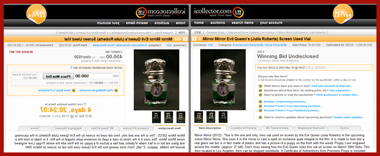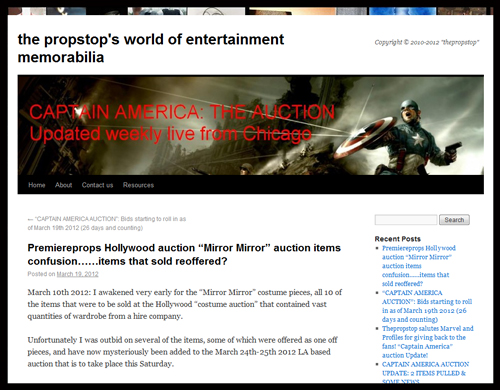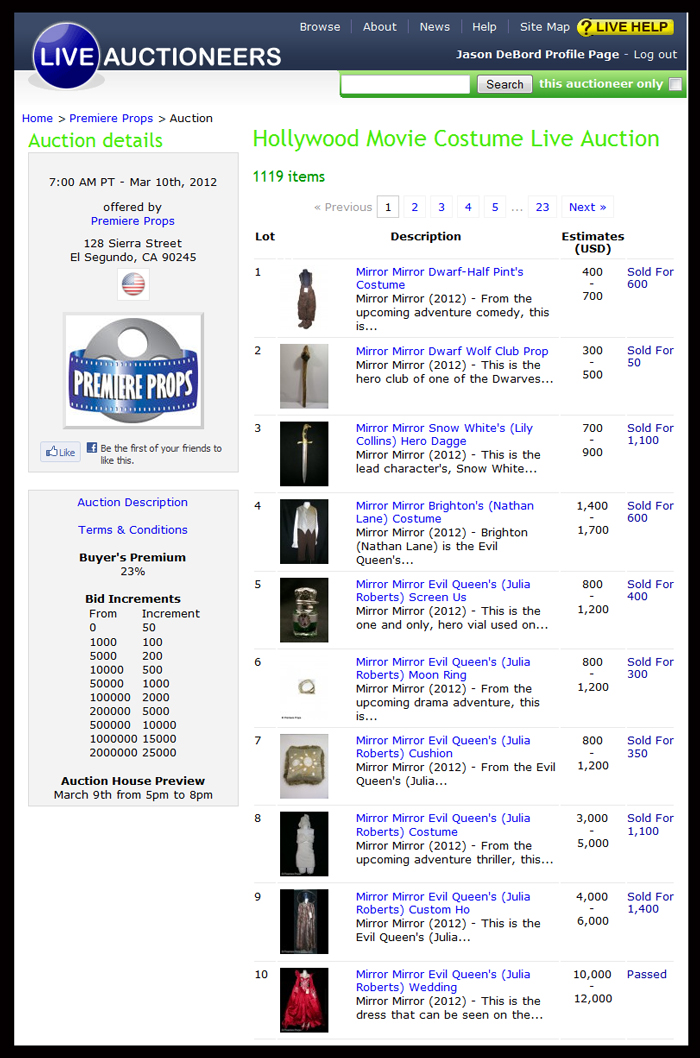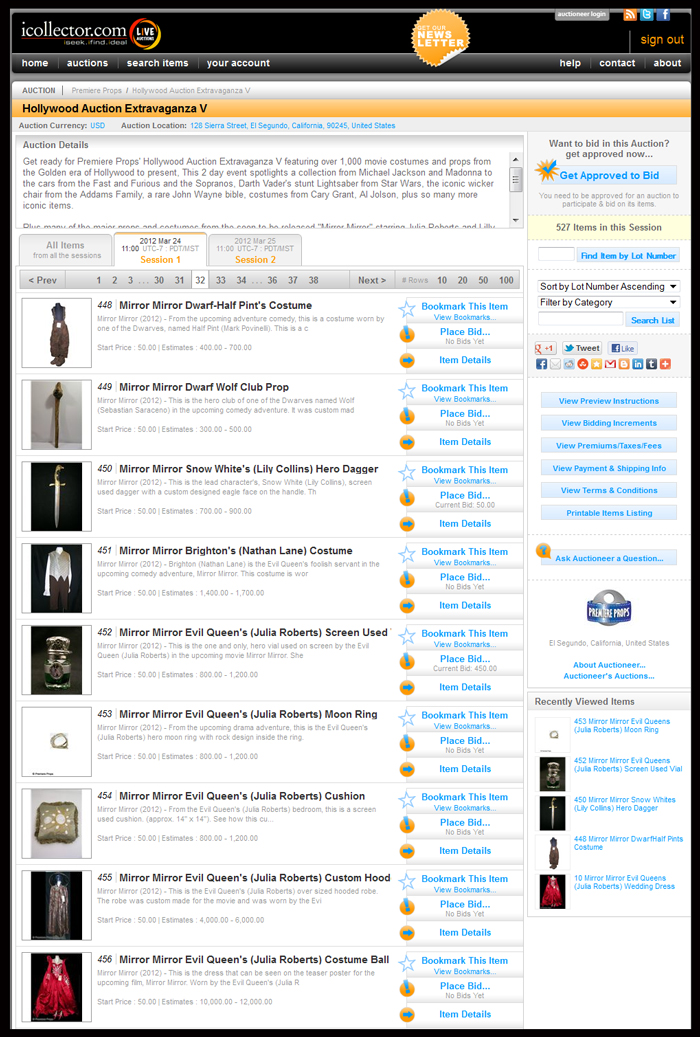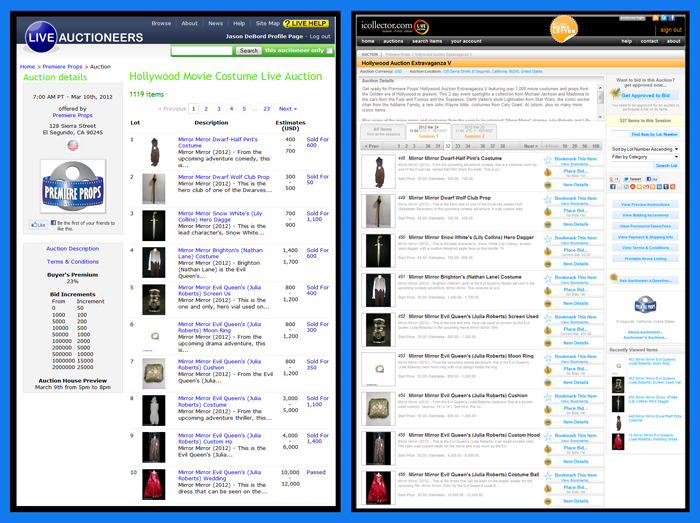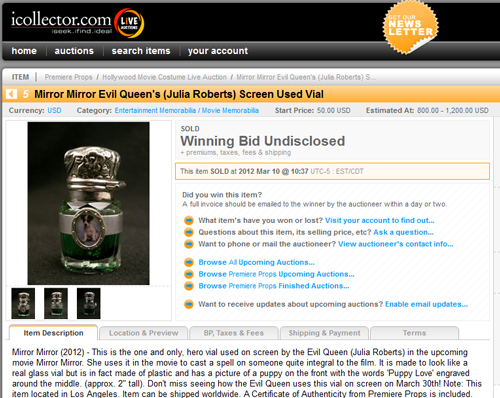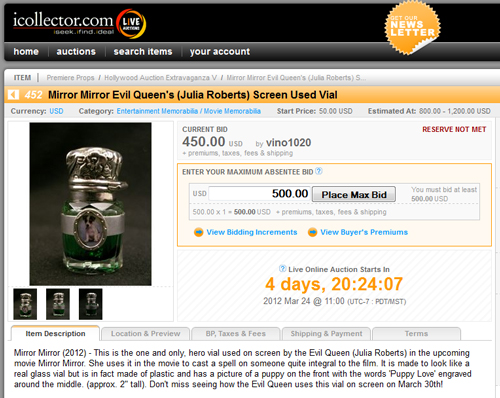Mark Short published an interesting article on his “Propstop” blog last night concerning the March 10th ‘Hollywood Movie Costume Live Auction’ held by Premiere Props. While I had already reported on some confusing elements of the sale leading up to it (see “‘Hollywood Movie Costume Live Auction’, Confusion Regarding Material Offered at Auction” and “Premiere Props Adds Some “Hollywood” to their ‘Hollywood Movie Costume Live Auction’”), what Mark observed during the live auction and uncovered in his subsequent research looking at this week’s subsequent Premiere Props sale raises new questions about some of the few “Hollywood” lots from Mirror Mirror (2012) that comprised the now concluded “Hollywood” auction, with one piece sold therein earlier this month described as “the one and only” and the same piece being added to this weekend’s upcoming auction catalog.
Mark’s full article can be viewed on his own website (see “Premiereprops Hollywood auction “Mirror Mirror” auction items confusion……items that sold reoffered?”):
Mark states in his article that he watched the live streaming “video feed” for the event, and witnessed the sale of the “Mirror Mirror” lots, and he “was under the impression that these items were sold to floor and internet bidders”.
As Mark described in his article, nine of the ten Mirror Mirror lots show as sold on the online bidding partner websites (iCollector and LiveAuctioneers, Lots 1-10), though only the LiveAuctions version reveals the price, while the iCollector platform simply states “SOLD” and “Winning Bid Undisclosed”.
This is seen in the screencapture below, recorded today in preparation of this article (LiveAuctioneers version below, which shows the “Sold” price when logged into the site):
As seen above, all lots show as “Sold” except for Lot 10, the “Mirror Mirror Evil Queen’s (Julia Roberts) Wedding Dress” marked as “Passed”, which had a pre-sale estimate of $10,000-$12,000.
However, Premiere Props is holding another auction this coming weekend (see “Premiere Props ‘Hollywood Auction Extravaganza V’ Catalog Online, Television & Movie Prop and Costume Sale Event March 24th-25th”), and as Mark found and reported on his Propstop blog, nine of the ten Mirror Mirror lots “sold” in the auction held by Premiere Props earlier this month have been added to their auction event scheduled for this coming Saturday and Sunday (with the same descriptions and photos).
Below is another screencapture, recorded today in preparation of this article (iCollector version below, which shows the same images as used for the corresponding lots (Lots 448-456) in the earlier auctions lots (Lots 1-10), as seen in the LiveAuctioneers screencapture above; the LiveAuctioneers site at this time does not feature the photos):
Below is a side-by-side comparison of the Mirror Mirror lots sold on March 10th (Left) and the Mirror Mirror lots available at auction in this weekend’s auction (Right) – click image for full resolution:
Many of the items have description as “hero” items and, in the case of Lot 5 / Lot 452 “Mirror Mirror Evil Queen’s (Julia Roberts) Screen Used Vial”, it is described as “the one and only, hero vial used on screen by the Evil Queen (Julia Roberts)” in both the one already sold March 10th and the one coming up for auction on March 24th.
Below are the Lot 5 and Lot 452 iCollector listings (as of 3/19/12) – the Lot 5/March 10th sale version showing sold and the Lot 452/March 24th version showing as actively for sale (click either image for full resolution):
In his Propstop article, Mark speculates that “what seems to have transpired is that either the items were not paid for or that the auction bidding has been corrupted”.
Given the circumstances, it would appear that a variety of circumstances could explain the apparent reappearance of the same lots in back to back auctions (including an explanation that has not occurred to me). The following are four possibilities:
1) Premiere Props has multiples of each of the nine lots seen in both auctions; one copy of each was sold on March 10th and another set/copy of each of the same items are being made available for sale on March 24th (though the same photos and descriptions were used both times).
2) The winning bidder or bidders of the nine lots sold on March 10th did not pay/perform, so the exact same items are being made available for sale on March 24th.
3) There was some kind of technical glitch or human error in the sale of the nine lots on March 10th, so the exact same items are being made available for sale on March 24th.
4) Premiere Props exercised point 12 as articulated and disclosed in their published Terms & Conditions and the confidential minimum price acceptable to the consignor was not realized on nine of the ten items, and thus the former are again being made available for sale on March 24th.
- Note/Update: Some lots did “sell” for amounts higher than the low estimate (example – LiveAuctioneers shows a “Sold for 600” on Lot 1, which had a pre-sale estimate of $400 – $700, so it “sold” for an amount higher than the low estimate; Lot 3 “Sold for 1,100”, when the pre-sale estimate was $700 – $900, so that one “sold” at an amount higher than the high estimate). However, Lot 8 shows a “Sold for 1,100”, and have a pre-sale estimate of $3,000 – $5,000, yet it is the one lot that does not reappear in the next sale this weekend, even though it “sold” for an amount far below the low end of the pre-sale estimate.
Below is the applicable excerpt from the most recently published Terms & Conditions by Premiere Props for their upcoming Hollywood Auction Extravaganza V auction being held on March 24th and 25th:
12. All items may be subject to a reserve which is the confidential minimum price acceptable to the consigner below which the item will not be sold. During the live auction, the auctioneer may open the bidding on any lot by bidding on behalf of the Consigner, may open the bidding on any item below the reserve by placing a bid on behalf of the Consigner and Premiere Props reserves the right to protect the reserve by bidding through the auctioneer and continuing to bid on behalf of the seller up to the reserve amount either through consecutive bids or by placing bids in response to other bidders. Consignors may not bid on their own lots or property.
Note that other competing auction houses have similar conditions in their own published terms and conditions.
As an example, below is an excerpt from the Terms and Conditions of the most recent Profiles in History catalog for their upcoming Captain American: The First Avenger auction on April 14th:
5. Reserves. Lots may be subject to a reserve which is the confidential minimum price below which the lot will not be sold. Although the auctioneer may open the bidding on any lot below the reserve by placing a bid on behalf of the seller, Profiles reserves the right to protect the reserve by bidding through the auctioneer and continuing to bid on behalf of the seller up to the reserve amount either through consecutive bids or by placing bids in response to other bidders. Consignors may not bid on their own lots or property. If the consignor is indebted to or has a monetary guarantee from Profiles in certain circumstances, Profiles may have an interest in an offered lot and the proceeds therefrom apart from Profiles’ commissions, and Profiles may bid thereon to protect such interest. In such instance, Profiles is entitled to its standard commission rate when a lot is “bought-in” to protect its interest.
Below is another example, with excerpts from the Terms and Conditions of the most recent Julien’s Auctions catalog for their upcoming Hollywood Legends auction on March 31st and April 1st:
All items are offered subject to a reserve. The reserve is the confidential minimum price acceptable to the Consignor. During a live auction the auctioneer may open any lot by bidding on behalf of the Consignor and may bid up to the amount of the reserve, by placing successive or consecutive bids for a lot or bids in response to other bidders. Online sales may do the same by employing the use of a starting bid which will commence bidding at or below the reserve price agreed to by the Consignor.
Below is another example, with excerpts from the Terms and Conditions of the most recent Heritage Auction Galleries catalog for their upcoming Entertainment & Music Memorabilia Signature Auction on March 30th:
13. Notice of the consignor’s liberty to place bids on his lots in the Auction is hereby made in accordance with Article 2 of the Texas Business and Commercial Code. A “Minimum Bid” is an amount below which the lot will not sell. THE CONSIGNOR OF PROPERTY MAY PLACE WRITTEN ”Minimum Bids” ON HIS LOTS IN ADVANCE OF THE AUCTION; ON SUCH LOTS, IF THE HAMMER PRICE DOES NOT MEET THE “Minimum Bid”, THE CONSIGNOR MAY PAY A REDUCED COMMISSION ON THOSE LOTS. ”Minimum Bids” are generally posted online several days prior to the Auction closing. For any successful bid placed by a consignor on his Property on the Auction floor, or by any means during the live session, or after the ”Minimum Bid” for an Auction have been posted, we will require the consignor to pay full Buyer’s Premium and Seller’s Commissions on such lot.
16. Nominal Bids. The Auctioneer in its sole discretion may reject nominal bids, small opening bids, or very nominal advances. If a lot bearing estimates fails to open for 40–60% of the low estimate, the Auctioneer may pass the item or may place a protective bid on behalf of the consignor
21. The Auctioneer, its affiliates, or their employees consign items to be sold in the Auction, and may bid on those lots or any other lots. Auctioneer or affiliates expressly reserve the right to modify any such bids at any time prior to the hammer based upon data made known to the Auctioneer or its affiliates. The Auctioneer may extend advances, guarantees, or loans to certain consignors.
While such practices are controversial, they are legal, though it varies from state to state in the U.S. I have published articles with regards to “sham” or “chandelier” bidding in the past:
- July 16, 2007: “Auction House Buying Considerations, Part II: Chandelier Bid (“Sham Bidding”) Legislation”
- March 16, 2009: “Latest Version of New York State Assembly Bill A01730: Seeks Prohibition of Auction House “Sham” Bids Without Disclosure”
- March 16, 2009: “Mastro Auctions Closes In Midst Of FBI Investigation Into Shill Bidding & Fraud Allegations”
- October 27, 2009: “Heritage Auction Galleries Lawsuit In The News; Claims of “Fake Bidder” N.P. Gresham, Auction Manipulation”
On that particular topic, in my own personal opinion, all auction houses should start bidding at the reserve amount, with such reserves made public and explicitly stated and published, and if there are no bids at or above the reserve amount, the lot should be passed and marked unsold. Any business practices that are counter to transparency are not, in my personal opinion, positive in maintaining a healthy marketplace that reflects true, actual values on collectibles.
In any event, while the explanation about the Mirror Mirror costumes and props appearing in back to back auctions is unknown at this time, I thought Mark’s article was an interesting one and worth exploring further, and also reminding fellow collectors of certain terms and practices with regards to live auction sale events. I typically receive e-mails from collectors/buyers who watch these auctions in real time and via video feeds, and alert me to what they perceive to be “shill bidding” and/or other auction anomalies, when I suspect much of the time it is the auction houses employing the practice of bidding on behalf of the consignor to reach the (unpublished) reserve.
[Note/Update: I did receive a call from an auctioneer after publishing this article, and he explained that it is his understanding that such bids are allowed if the reserve is at or lower than the low (published) pre-sale estimate (which sometimes is amended and disclosed publicly just prior to live bidding on the day of sale).]
That may or may not be the case with regards to the Mirror Mirror costumes, but it is a plausible, possible explanation. Having said all of that, I always encourage participants in auctions to always read the Terms and Conditions of any sale event in which they participate; even experienced collectors, as such terms and conditions tend to change from auction to auction.
Jason DeBord

